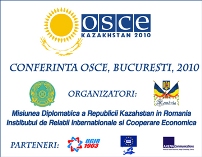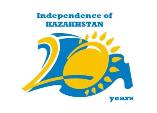EURASIA SECURITY CONCEPT. A PLAN FOR PEACE AND STABILITY IN THE XXI CENTURY By Professor dr Anton Caragea MA, FINS, EDA
The illusory perfect world of the XXI century.
At the beginning of the twentieth century optimistic geopolitics, led by the famous thinker Francis Fukuyama, believed that we are witnessing the fulfilling prophecy on the end of history.
At first glance everything seemed to give them justice: the market economy seem to liquidate traditional inequalities between countries and promised an era of overall development and steady growth of the living standards.
If, on the level of the individual safety, market economy promised abundance and absence of crises, in the field of global security the developments seemed to ensure a better future.
The permanent EU enlargement ensured security on the European continent, joining former Cold War adversaries in a forum of development, democracy, security and general welfare, it seemed that a future in which even Russia will become a member of the European Union was not one too far away.
On military level NATO appeared to be an invincible military shield and it seemed to become even a global alliance which was to provide at indications of the Security Council, missions to impose global order. The global equation of stability seems solidly built.
Nothing has remained from this perfect picture of a better world.
NATO intervention in Afghanistan and the defeat suffered has influenced the future plans of the Alliance, the announced withdrawal from Afghanistan in 2014, ends long-standing contingency plans for NATO trouble spots.
From now on there will be only punctual interventions with duration of less than one year, the only ones that the Alliance can do effectively.
Instead of a coherent NATO interventions focusing on post-conflict reconstruction, we started to become witnesses of illegal intervention or of unilateral actions from the NATO members, which do not only exceed the action out of the alliance, but it also contradicts its fundamental principles.
The EU crisis, which began as an economic crisis that hit Greece, Spain, Portugal and Ireland became a general economic crisis and blocked the expansion of the political union, expansion was supposed to be a future of prosperity for Europe.
The EU political crisis threatens more and more achievements that were once considered as permanent certainties: the right to free movement is questioned, the right to work is severely restricted and fined and the portrait of EU as a club of democracies is as severe questioned by the expansion of right-wing parties and by the blocking of the democratic mechanisms which no longer work on the continent.
Increased security risks.
The collapse of the safety certainties led to the revival and development of security risks: forgotten border conflicts are worldwide present, territorial conflicts in the Far East are among the most visible.
In Europe, the Kosovo crisis questioned the stability of the boundaries drawn after World War II, and there are here additional trouble spots throughout the Balkans and throughout Central Europe.
All these attract with them increased security risks and general instability, with only two possible outcomes: return to arms race and to the conflicts we thought forgotten after 1945 or rebuilding a new system of global security.
Voice of reason.
In September 2012, when leaders of the Conference on Interaction and Confidence Building Measures in Asia (CICA) was held in Astana, capital of Kazakhstan, the usual speech reception, group pictures and final smiles were expected.
They were to have a surprise. Before them, their host President Nursultan Nazarbayev presented a comprehensive project to revive the dialogue and reduce tensions in the Euro-Asian.
It was not the first time the president of Kazakhstan surprised their guests with comprehensive and ambitious reform plans.
Everyone remembers in 2010, when Kazakhstan took over the Chairmanship of the Organization for Security and Cooperation in Europe (OSCE).
Everyone expected a usual cosmetic presidency, of a prestigious organization in free fall and utility. It was not to be like this.
President Nursultan Nazarbayev launched a project to reform and restructure the OSCE, put in foreground the overall security projects and the restoration of OSCE action potential. The organization was not able to meet leaders in 1999, Kazakhstan has managed to achieve this performance. OSCE failed for two decades to bring together the civil society leaders, but in 2010, within the Conference of Bucharest, Kazakhstan has managed to do that.
At the end of a one year term, Kazakhstan has managed to inject fresh vigor into an organization that seemed irreversible affected by routine and inefficiency.
Now the voice of reason, the voice of Kazakhstan, is heard again: it is time for a platform of security and cooperation in the Euro-Asian and Euro-Atlantic area.
The security and cooperation platform.
The New Security and Cooperation initiative, launched by President Nursultan Nazarbayev states:
– Creation of a zone of stability that connects the Atlantic and Asia, the European and Asian continents.
– Establishment of a mechanism of interaction, flexible and based on tangible results and creation of communication channels.
– Unification of the countless existing organizations on global security: NATO (North Atlantic Treaty Organization), CSOT (Collective Security Treaty Organization), CICA (Conference on Interaction and Confidence Building Measures in Asia), the OSCE (Organization for Security and Cooperation in Europe).
– Focus of the dialogue on general security issues, banning the nuclear tests – initiative ATOM (stopping nuclear tests worldwide)
The methods of the new organization: Platform for Security and Cooperation Euro-Asian and they promise to help ease the global climate:
– Imposing the consensus as the only method of action of the new organization
– Solving of the crises by dialogue and diplomatic means
– Focus new organization on the central problems such as geopolitical rivalry / reducing global distrust / fight illegal migration / fight against trafficking in human beings and drugs / counter terrorism and extremism and suppression of territorial claims.
Kazakhstan – clear action, concrete results.
President Nursultan Nazarbayev said from the very beginning that his country will lead by example and will convince through clear results about the usefulness of its initiative.
Thus Kazakhstan launched in 1990, a successful initiative for the denuclearization of the region Central Asia, closed the nuclear test polygon from Semipalatinsk and gave up a huge arsenal of nuclear weapons (third in the world after the U.S. and Russia).
With such results, Kazakhstan took the flag of the fight for nuclear disarmament, having demonstrated that a nuclear country may renounce its weapons for promoting world peace. Not by words but by deeds, seems to be the motto of Kazakhstan’s international action.
Thus, President Nazarbayev announced at the nuclear disarmament meeting in Seoul, the initiative to create an international bank for uranium, an entity meant to control the resources and use of nuclear material for peaceful projects.
The establishment of such a bank would block traffic fusion materials, would allow nuclear arms control and allow the commencement of global nuclear disarmament. The new initiative received immediate support from the United States and the United Nations, as being the only reasonable proposal to address the problem of trafficking in nuclear materials.
Meanwhile, Kazakhstan has proposed a less ambitious goal, the ATOM initiative to ban nuclear tests and has made this initiative a decision available to all people, building a specialized website where any responsible citizen can support initiatives designed to have a world without the risk of nuclear tests.
In Afghanistan, where the military solution failed, Kazakhstan has shown that the humanitarian solution gives results: hundreds of Afghan students graduate courses in Kazakh universities, laying the foundations, by providing the necessary personnel for the economic, administrative and health recovery of a country devastated and laying the foundations of a return to normality. Also construction of social facilities (schools, hospitals, health centers) developed the only strategy that works: higher standards of living.
The counter-drug fight reduces the sources of income of the destructive elements and Afghanistan rises again from the ashes of a failed military intervention.
As to the economic crisis, the Kazakhstan’s president has built in his country the third world economy as growth rate, but he was concerned that only nation achieves economic growth, but he also provided a platform for combating global crisis.
The solutions to fight the crisis were offered free, together with the necessary consultation.
While other solutions have failed and world organizations have enormous cost, the Kazakhstan’s offers as a solution to the crisis is only up to people affected by the crisis if they want to apply or not.
Finally, the most recent contribution of Kazakhstan to the political and economic crisis, is the rebuilding the Silk Road. The Silk Road brought prosperity and security from Asia to Europe for two millennia.
Now with 5,000 kilometers of road built by Kazakhstan will link China to St. Petersburg and bring raw materials in emerging markets in Asia and will connect the European consumers with products offered by the Asian market.
By its revolution in transport, Kazakhstan has become the bridge between Asia and Europe, the area of transport and logistics and has become the host of dozens of trans-regional and multilateral organizations, connecting the Asia-Pacific, Europe-Atlantic area.
Romania-Kazakhstan: a joint voice for global security
After offering the example of a modern nation, contributing effectively to the global debate on crucial issues such as nuclear safety and solving of the global economic crisis, the new proposal of the President Nursultan Nazarbayev promises to offer a solution to avoid a ravaging conflict in the XXI century.
Romania’s response to the initiative of Kazakhstan can only be positive, given the long tradition of Romanian efforts towards disarmament and creation of a global security system.
The Romanian voice must be with Kazakhstan’s initiative in setting up the platform for Security and Cooperation in the Euro-Asian and Euro-Atlantic integration, as the only reliable solution to ensure not only national security but also to bring our contribution to the great idea debate of the century.
Our country’s voice must be heard again in support of world peace!
Speech delivered by professor dr. Anton Caragea as the President of Conference for Security and Cooperation in Europe and Asia -Bucharest-November 2012











